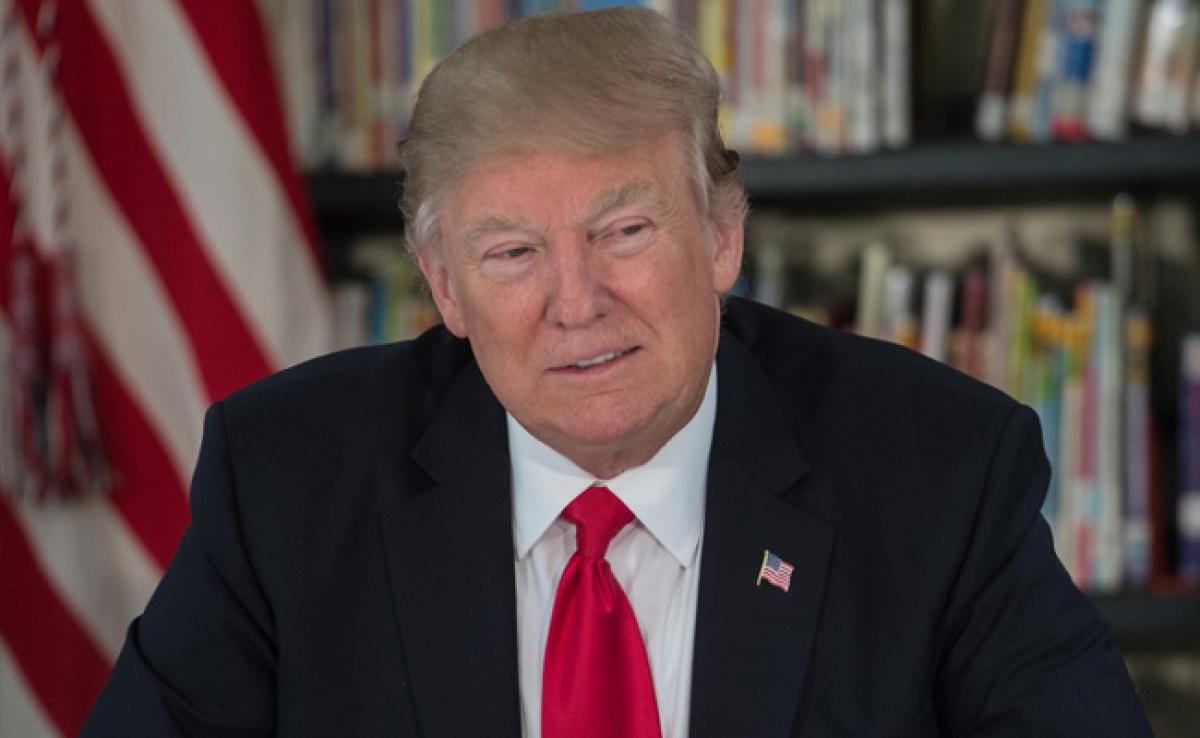Live
- ‘Vizag Navy Marathon 2024’ garners encouraging response
- Amarajeevi’s 125th birth anniv to be grand event
- Several aspirants miss the Group-II bus by a whisker
- Cabinet meeting in Assembly today
- Over 7,600 Syrians return from Turkiye in five days after Assad's downfall: minister
- Delhi BJP leaders stay overnight in 1,194 slum clusters
- Keerthy Suresh and Anthony Thattil Tie the Knot in a Christian Ceremony
- AAP, BJP making false promises to slum dwellers for votes: Delhi Congress
- 'Vere Level Office' Review: A Refreshing Take on Corporate Life with Humor and Heart
- Libya's oil company declares force majeure at key refinery following clashes
Just In

A federal court in Hawaii on Wednesday halted Donald Trump\'s revised executive order temporarily closing US borders to refugees and nationals from six Muslim-majority countries, dealing the president a humiliating fresh defeat.
A federal court in Hawaii on Wednesday halted Donald Trump's revised executive order temporarily closing US borders to refugees and nationals from six Muslim-majority countries, dealing the president a humiliating fresh defeat.
US District Judge Derrick Watson ruled that the state of Hawaii, in its legal challenge to the order, had established a strong likelihood that the ban would cause "irreparable injury" were it to go ahead.
The court in Honolulu was the first to rule in a trio of legal challenges against the ban, which had been set to go into effect at midnight.
Decisions were expected later Wednesday from federal courts in Washington state and Maryland.
The ruling means a nationwide freeze on enforcement of section two of the order, banning entry by nationals of Iran, Libya, Somalia, Sudan, Syria and Yemen for 90 days.
It also halts section six, which would have suspended the US refugee admissions program for 120 days.
There was no immediate comment from the White House, which had argued that the travel ban is necessary to keep extremists from entering the United States.
The Trump administration's wide-ranging initial travel restrictions imposed on January 27 were slapped down by the federal courts, after sparking a legal, political and logistical furor.
Trump signed a revised ban behind closed doors on March 6 with a reduced scope exempting Iraqis and permanent US residents but maintaining the temporary ban on the other six countries and refugees.
The White House said those six countries were targeted because their screening and information capabilities could not meet US security requirements.
But Watson rejected the White House claim that the order wasn't a Muslim ban, ruling that it would not be a leap "to conclude that targeting these countries likewise targets Islam," because of their Muslim populations range from 90.7 percent to 99.8 percent.
The judge made reference to several examples of Trump explicitly framing proposed action on immigration in religious language, including a March 2016 interview during which the then president-elect said: "I think Islam hates us."
"Mr. Trump was asked, 'Is there a war between the West and radical Islam, or between the West and Islam itself?' He replied: 'It's very hard to separate. Because you don't know who's who,'" the judge added.
Chaos
In Greenbelt, Maryland, Judge Theodore Chuang was expected to rule on a separate complaint filed by a coalition of advocacy groups that the amended order discriminates against Muslims.
"In his mind, the danger of Muslims and the danger of refugees is all combined danger," Omar Jadwat, a lawyer for the American Civil Liberties Union, said of the president.
The first version of Trump's order triggered protests at home and abroad as well as chaos at US airports as people were detained upon arrival and either held for hours or sent back to where they came from.
The Trump administration narrowed the restrictions in its revised order to try to ensure it would be unassailable this time around.
"This order doesn't draw any religious distinction at all," said Jeffrey Wall, a government attorney.
Questioned about tweets that Trump sent and statements he made during the presidential campaign in which he promised to enact a "Muslim ban," Wall said: "There is a difference between a president and a candidate."
Coast to coast
But critics say the new order essentially remains a ban on Muslims coming to the United States, and therefore unconstitutional because it singles out people of a certain religion for discrimination.
Since September 11, 2001, the worst attacks in the United States have been committed either by radicalized Americans or by people from countries not on the Trump travel ban list.
Critics also argue that it will have a very negative effect on schools, universities and the business world, mainly the high tech sector, which employs many highly skilled immigrants.
The new battle against Trump's order is being played out on several geographical fronts, but mainly on the west coast, which tends to be pro-Democrat.
The state of Washington, joined by five other states, filed a complaint Monday with the same Seattle judge who stayed Trump's original travel ban in February.
Trump responded by insulting that federal magistrate, James Robart, calling him a "so-called judge."
Robart will oversee the Washington state hearing on Wednesday and he could once again suspend all or part of the new order.

© 2024 Hyderabad Media House Limited/The Hans India. All rights reserved. Powered by hocalwire.com







